Tesco Plc and Its Management Practices
VerifiedAdded on 2020/10/23
|8
|2368
|250
AI Summary
The assignment analyzes Tesco Plc's management practices, focusing on participative leadership theory and administrative management theory. It highlights the significance of employee engagement and the responsibilities of leaders to ensure effective business execution. The document also explores the impact of transformational leadership style on employee motivation and engagement. By examining these theories and practices, the assignment aims to provide insights into Tesco Plc's organizational culture and management approach.
Contribute Materials
Your contribution can guide someone’s learning journey. Share your
documents today.
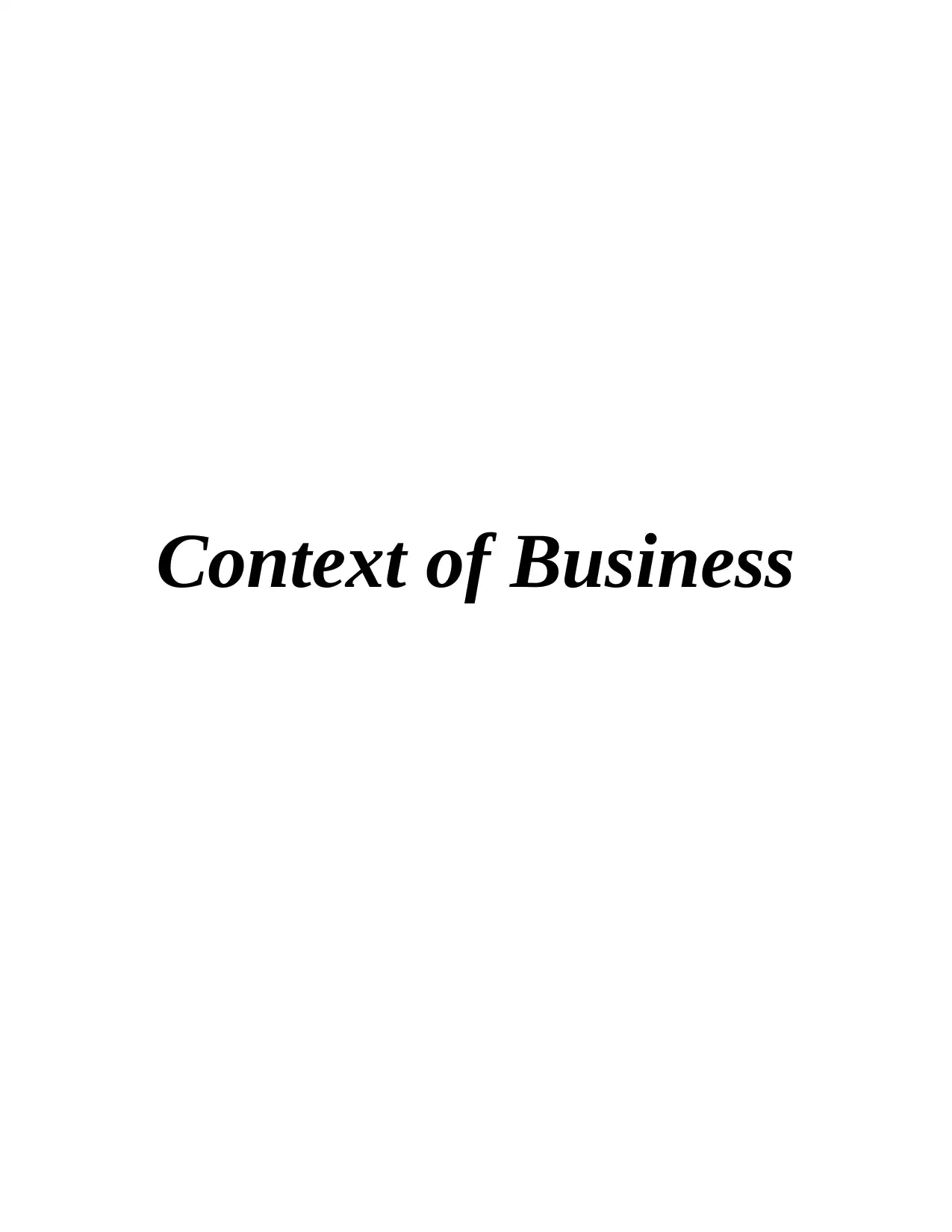
Context of Business
Secure Best Marks with AI Grader
Need help grading? Try our AI Grader for instant feedback on your assignments.
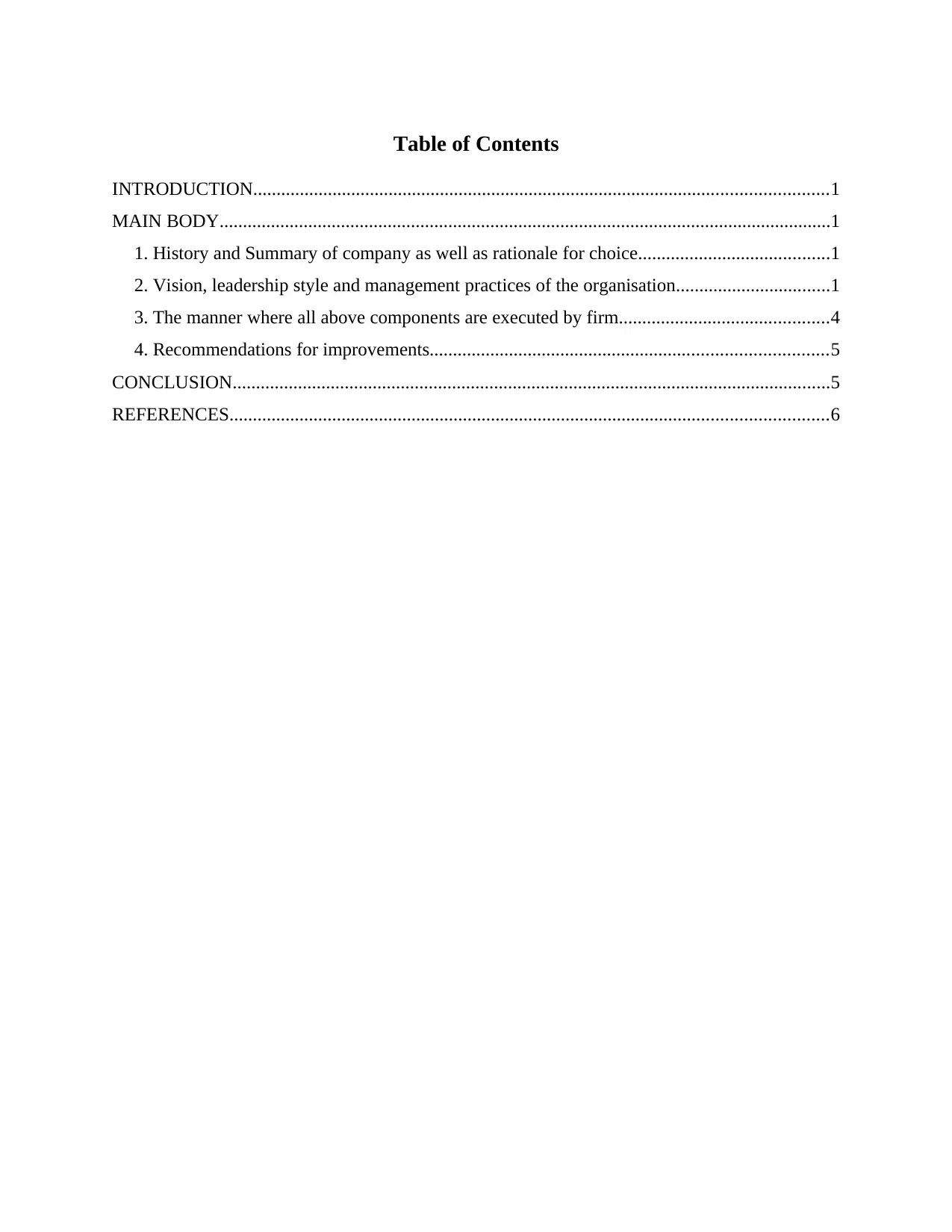
Table of Contents
INTRODUCTION...........................................................................................................................1
MAIN BODY...................................................................................................................................1
1. History and Summary of company as well as rationale for choice.........................................1
2. Vision, leadership style and management practices of the organisation.................................1
3. The manner where all above components are executed by firm.............................................4
4. Recommendations for improvements.....................................................................................5
CONCLUSION................................................................................................................................5
REFERENCES................................................................................................................................6
INTRODUCTION...........................................................................................................................1
MAIN BODY...................................................................................................................................1
1. History and Summary of company as well as rationale for choice.........................................1
2. Vision, leadership style and management practices of the organisation.................................1
3. The manner where all above components are executed by firm.............................................4
4. Recommendations for improvements.....................................................................................5
CONCLUSION................................................................................................................................5
REFERENCES................................................................................................................................6
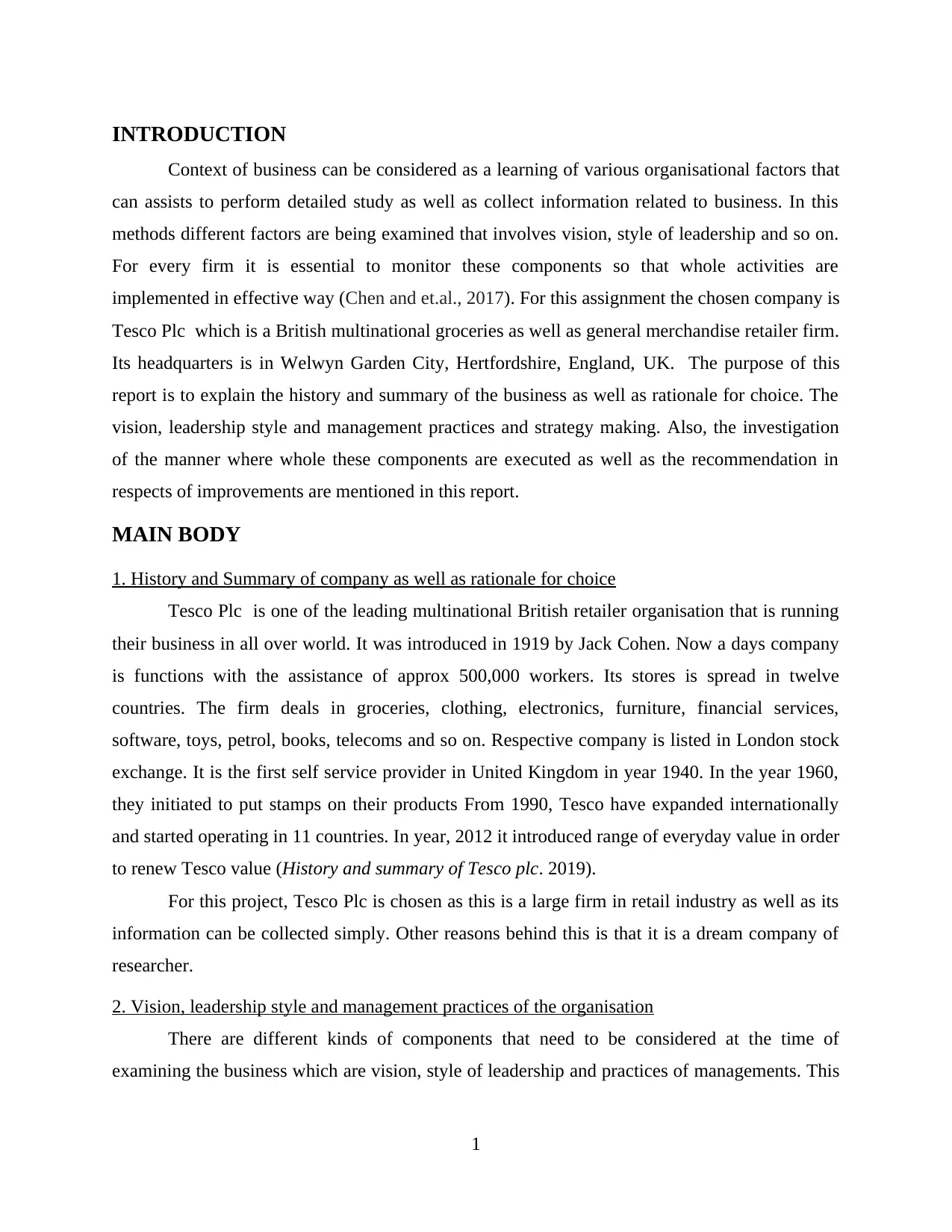
INTRODUCTION
Context of business can be considered as a learning of various organisational factors that
can assists to perform detailed study as well as collect information related to business. In this
methods different factors are being examined that involves vision, style of leadership and so on.
For every firm it is essential to monitor these components so that whole activities are
implemented in effective way (Chen and et.al., 2017). For this assignment the chosen company is
Tesco Plc which is a British multinational groceries as well as general merchandise retailer firm.
Its headquarters is in Welwyn Garden City, Hertfordshire, England, UK. The purpose of this
report is to explain the history and summary of the business as well as rationale for choice. The
vision, leadership style and management practices and strategy making. Also, the investigation
of the manner where whole these components are executed as well as the recommendation in
respects of improvements are mentioned in this report.
MAIN BODY
1. History and Summary of company as well as rationale for choice
Tesco Plc is one of the leading multinational British retailer organisation that is running
their business in all over world. It was introduced in 1919 by Jack Cohen. Now a days company
is functions with the assistance of approx 500,000 workers. Its stores is spread in twelve
countries. The firm deals in groceries, clothing, electronics, furniture, financial services,
software, toys, petrol, books, telecoms and so on. Respective company is listed in London stock
exchange. It is the first self service provider in United Kingdom in year 1940. In the year 1960,
they initiated to put stamps on their products From 1990, Tesco have expanded internationally
and started operating in 11 countries. In year, 2012 it introduced range of everyday value in order
to renew Tesco value (History and summary of Tesco plc. 2019).
For this project, Tesco Plc is chosen as this is a large firm in retail industry as well as its
information can be collected simply. Other reasons behind this is that it is a dream company of
researcher.
2. Vision, leadership style and management practices of the organisation
There are different kinds of components that need to be considered at the time of
examining the business which are vision, style of leadership and practices of managements. This
1
Context of business can be considered as a learning of various organisational factors that
can assists to perform detailed study as well as collect information related to business. In this
methods different factors are being examined that involves vision, style of leadership and so on.
For every firm it is essential to monitor these components so that whole activities are
implemented in effective way (Chen and et.al., 2017). For this assignment the chosen company is
Tesco Plc which is a British multinational groceries as well as general merchandise retailer firm.
Its headquarters is in Welwyn Garden City, Hertfordshire, England, UK. The purpose of this
report is to explain the history and summary of the business as well as rationale for choice. The
vision, leadership style and management practices and strategy making. Also, the investigation
of the manner where whole these components are executed as well as the recommendation in
respects of improvements are mentioned in this report.
MAIN BODY
1. History and Summary of company as well as rationale for choice
Tesco Plc is one of the leading multinational British retailer organisation that is running
their business in all over world. It was introduced in 1919 by Jack Cohen. Now a days company
is functions with the assistance of approx 500,000 workers. Its stores is spread in twelve
countries. The firm deals in groceries, clothing, electronics, furniture, financial services,
software, toys, petrol, books, telecoms and so on. Respective company is listed in London stock
exchange. It is the first self service provider in United Kingdom in year 1940. In the year 1960,
they initiated to put stamps on their products From 1990, Tesco have expanded internationally
and started operating in 11 countries. In year, 2012 it introduced range of everyday value in order
to renew Tesco value (History and summary of Tesco plc. 2019).
For this project, Tesco Plc is chosen as this is a large firm in retail industry as well as its
information can be collected simply. Other reasons behind this is that it is a dream company of
researcher.
2. Vision, leadership style and management practices of the organisation
There are different kinds of components that need to be considered at the time of
examining the business which are vision, style of leadership and practices of managements. This
1
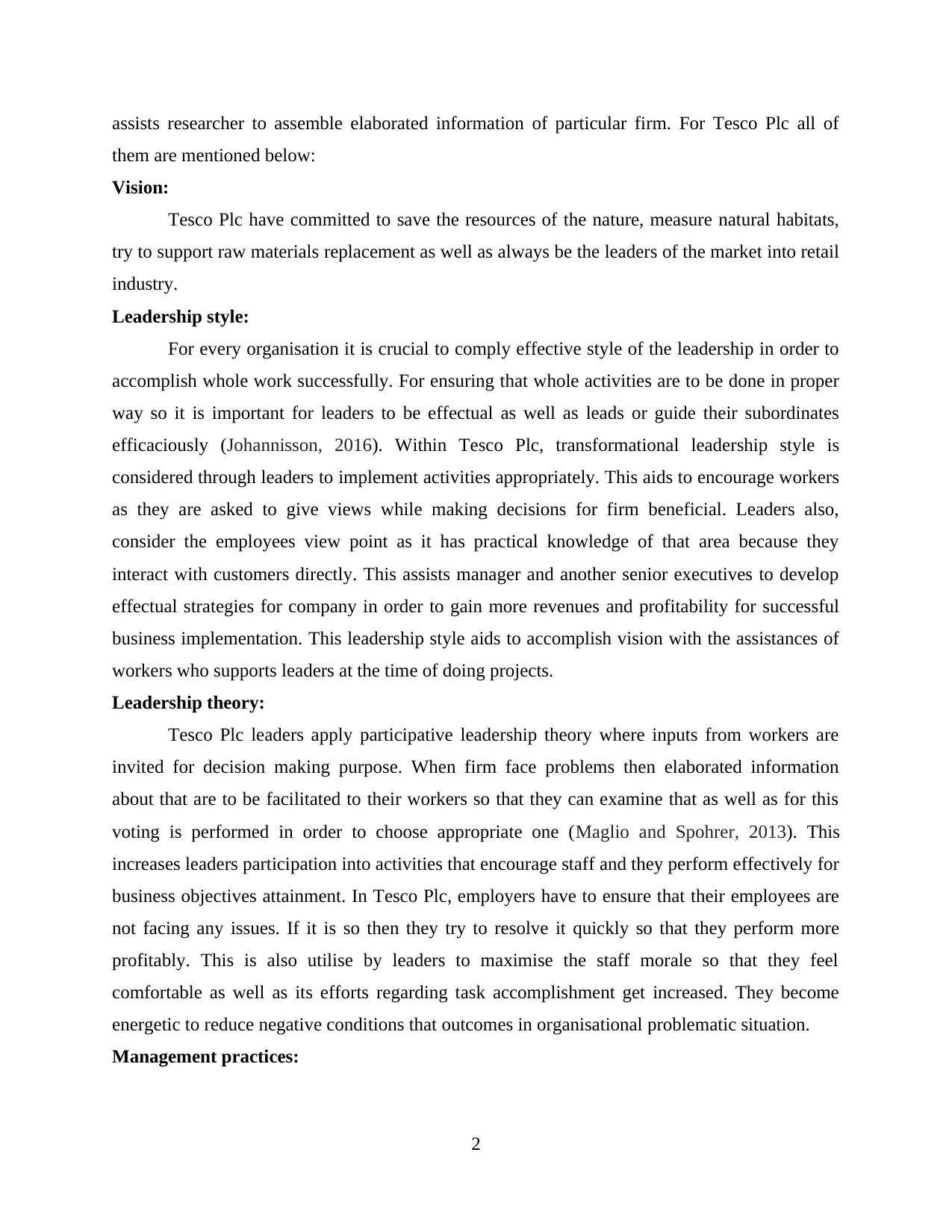
assists researcher to assemble elaborated information of particular firm. For Tesco Plc all of
them are mentioned below:
Vision:
Tesco Plc have committed to save the resources of the nature, measure natural habitats,
try to support raw materials replacement as well as always be the leaders of the market into retail
industry.
Leadership style:
For every organisation it is crucial to comply effective style of the leadership in order to
accomplish whole work successfully. For ensuring that whole activities are to be done in proper
way so it is important for leaders to be effectual as well as leads or guide their subordinates
efficaciously (Johannisson, 2016). Within Tesco Plc, transformational leadership style is
considered through leaders to implement activities appropriately. This aids to encourage workers
as they are asked to give views while making decisions for firm beneficial. Leaders also,
consider the employees view point as it has practical knowledge of that area because they
interact with customers directly. This assists manager and another senior executives to develop
effectual strategies for company in order to gain more revenues and profitability for successful
business implementation. This leadership style aids to accomplish vision with the assistances of
workers who supports leaders at the time of doing projects.
Leadership theory:
Tesco Plc leaders apply participative leadership theory where inputs from workers are
invited for decision making purpose. When firm face problems then elaborated information
about that are to be facilitated to their workers so that they can examine that as well as for this
voting is performed in order to choose appropriate one (Maglio and Spohrer, 2013). This
increases leaders participation into activities that encourage staff and they perform effectively for
business objectives attainment. In Tesco Plc, employers have to ensure that their employees are
not facing any issues. If it is so then they try to resolve it quickly so that they perform more
profitably. This is also utilise by leaders to maximise the staff morale so that they feel
comfortable as well as its efforts regarding task accomplishment get increased. They become
energetic to reduce negative conditions that outcomes in organisational problematic situation.
Management practices:
2
them are mentioned below:
Vision:
Tesco Plc have committed to save the resources of the nature, measure natural habitats,
try to support raw materials replacement as well as always be the leaders of the market into retail
industry.
Leadership style:
For every organisation it is crucial to comply effective style of the leadership in order to
accomplish whole work successfully. For ensuring that whole activities are to be done in proper
way so it is important for leaders to be effectual as well as leads or guide their subordinates
efficaciously (Johannisson, 2016). Within Tesco Plc, transformational leadership style is
considered through leaders to implement activities appropriately. This aids to encourage workers
as they are asked to give views while making decisions for firm beneficial. Leaders also,
consider the employees view point as it has practical knowledge of that area because they
interact with customers directly. This assists manager and another senior executives to develop
effectual strategies for company in order to gain more revenues and profitability for successful
business implementation. This leadership style aids to accomplish vision with the assistances of
workers who supports leaders at the time of doing projects.
Leadership theory:
Tesco Plc leaders apply participative leadership theory where inputs from workers are
invited for decision making purpose. When firm face problems then elaborated information
about that are to be facilitated to their workers so that they can examine that as well as for this
voting is performed in order to choose appropriate one (Maglio and Spohrer, 2013). This
increases leaders participation into activities that encourage staff and they perform effectively for
business objectives attainment. In Tesco Plc, employers have to ensure that their employees are
not facing any issues. If it is so then they try to resolve it quickly so that they perform more
profitably. This is also utilise by leaders to maximise the staff morale so that they feel
comfortable as well as its efforts regarding task accomplishment get increased. They become
energetic to reduce negative conditions that outcomes in organisational problematic situation.
Management practices:
2
Secure Best Marks with AI Grader
Need help grading? Try our AI Grader for instant feedback on your assignments.
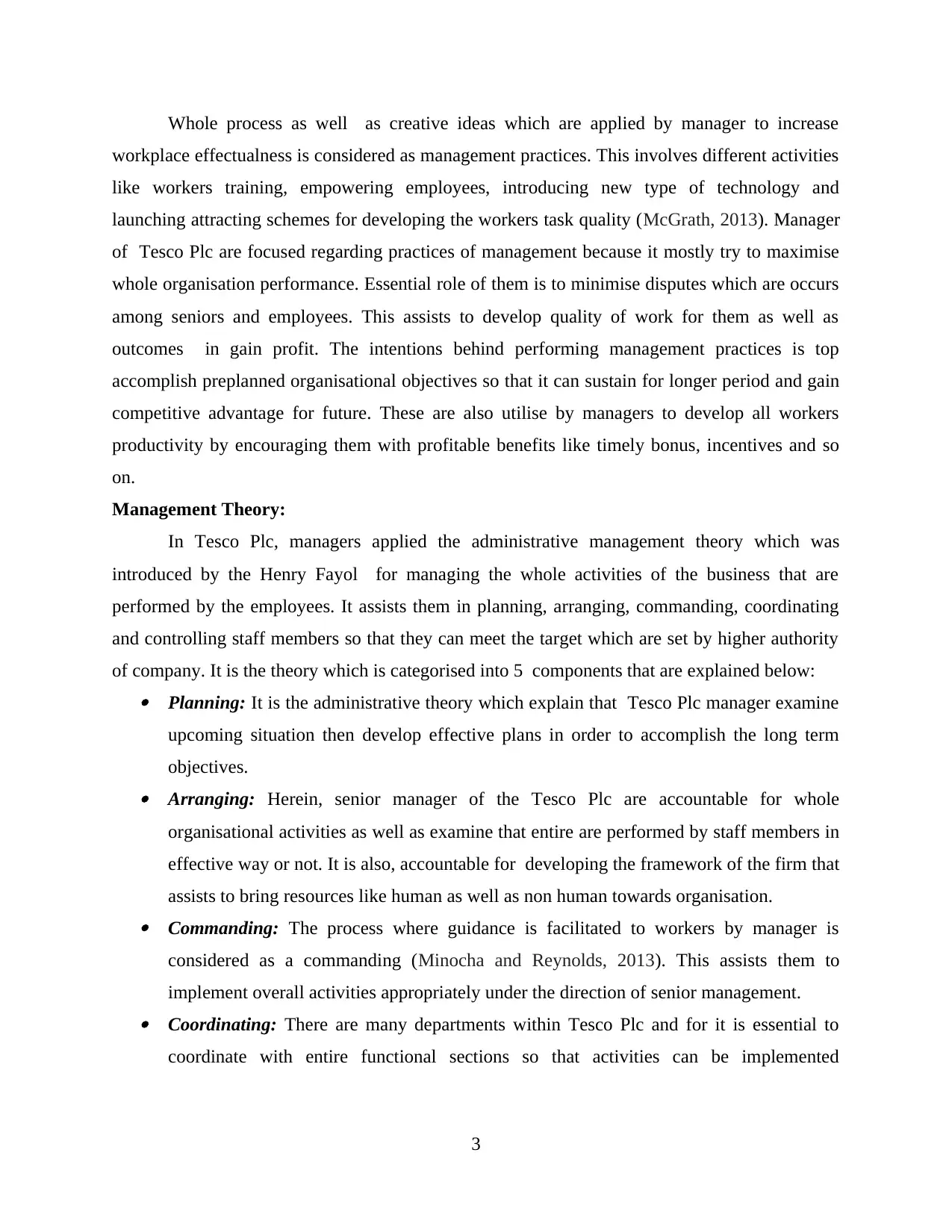
Whole process as well as creative ideas which are applied by manager to increase
workplace effectualness is considered as management practices. This involves different activities
like workers training, empowering employees, introducing new type of technology and
launching attracting schemes for developing the workers task quality (McGrath, 2013). Manager
of Tesco Plc are focused regarding practices of management because it mostly try to maximise
whole organisation performance. Essential role of them is to minimise disputes which are occurs
among seniors and employees. This assists to develop quality of work for them as well as
outcomes in gain profit. The intentions behind performing management practices is top
accomplish preplanned organisational objectives so that it can sustain for longer period and gain
competitive advantage for future. These are also utilise by managers to develop all workers
productivity by encouraging them with profitable benefits like timely bonus, incentives and so
on.
Management Theory:
In Tesco Plc, managers applied the administrative management theory which was
introduced by the Henry Fayol for managing the whole activities of the business that are
performed by the employees. It assists them in planning, arranging, commanding, coordinating
and controlling staff members so that they can meet the target which are set by higher authority
of company. It is the theory which is categorised into 5 components that are explained below: Planning: It is the administrative theory which explain that Tesco Plc manager examine
upcoming situation then develop effective plans in order to accomplish the long term
objectives. Arranging: Herein, senior manager of the Tesco Plc are accountable for whole
organisational activities as well as examine that entire are performed by staff members in
effective way or not. It is also, accountable for developing the framework of the firm that
assists to bring resources like human as well as non human towards organisation. Commanding: The process where guidance is facilitated to workers by manager is
considered as a commanding (Minocha and Reynolds, 2013). This assists them to
implement overall activities appropriately under the direction of senior management. Coordinating: There are many departments within Tesco Plc and for it is essential to
coordinate with entire functional sections so that activities can be implemented
3
workplace effectualness is considered as management practices. This involves different activities
like workers training, empowering employees, introducing new type of technology and
launching attracting schemes for developing the workers task quality (McGrath, 2013). Manager
of Tesco Plc are focused regarding practices of management because it mostly try to maximise
whole organisation performance. Essential role of them is to minimise disputes which are occurs
among seniors and employees. This assists to develop quality of work for them as well as
outcomes in gain profit. The intentions behind performing management practices is top
accomplish preplanned organisational objectives so that it can sustain for longer period and gain
competitive advantage for future. These are also utilise by managers to develop all workers
productivity by encouraging them with profitable benefits like timely bonus, incentives and so
on.
Management Theory:
In Tesco Plc, managers applied the administrative management theory which was
introduced by the Henry Fayol for managing the whole activities of the business that are
performed by the employees. It assists them in planning, arranging, commanding, coordinating
and controlling staff members so that they can meet the target which are set by higher authority
of company. It is the theory which is categorised into 5 components that are explained below: Planning: It is the administrative theory which explain that Tesco Plc manager examine
upcoming situation then develop effective plans in order to accomplish the long term
objectives. Arranging: Herein, senior manager of the Tesco Plc are accountable for whole
organisational activities as well as examine that entire are performed by staff members in
effective way or not. It is also, accountable for developing the framework of the firm that
assists to bring resources like human as well as non human towards organisation. Commanding: The process where guidance is facilitated to workers by manager is
considered as a commanding (Minocha and Reynolds, 2013). This assists them to
implement overall activities appropriately under the direction of senior management. Coordinating: There are many departments within Tesco Plc and for it is essential to
coordinate with entire functional sections so that activities can be implemented
3
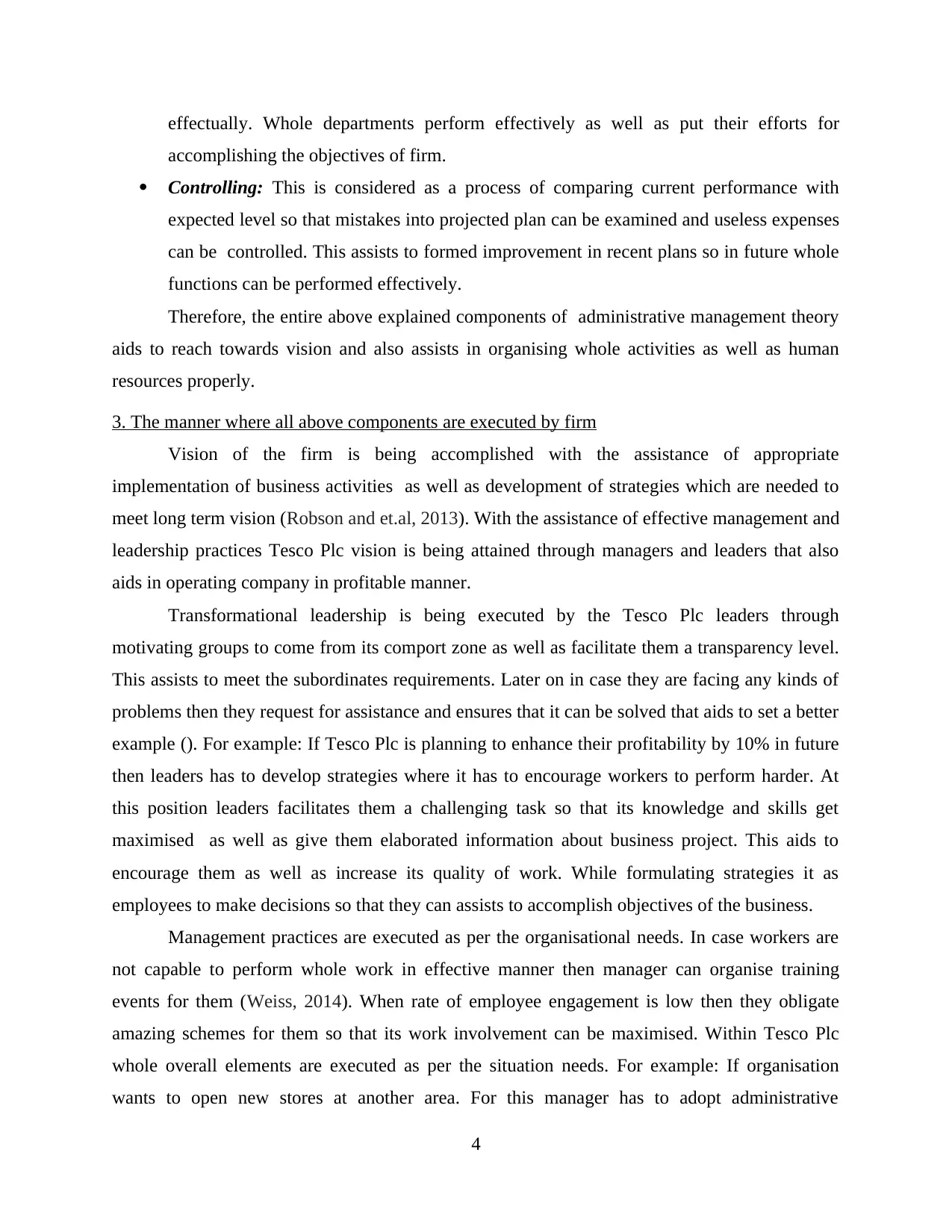
effectually. Whole departments perform effectively as well as put their efforts for
accomplishing the objectives of firm.
Controlling: This is considered as a process of comparing current performance with
expected level so that mistakes into projected plan can be examined and useless expenses
can be controlled. This assists to formed improvement in recent plans so in future whole
functions can be performed effectively.
Therefore, the entire above explained components of administrative management theory
aids to reach towards vision and also assists in organising whole activities as well as human
resources properly.
3. The manner where all above components are executed by firm
Vision of the firm is being accomplished with the assistance of appropriate
implementation of business activities as well as development of strategies which are needed to
meet long term vision (Robson and et.al, 2013). With the assistance of effective management and
leadership practices Tesco Plc vision is being attained through managers and leaders that also
aids in operating company in profitable manner.
Transformational leadership is being executed by the Tesco Plc leaders through
motivating groups to come from its comport zone as well as facilitate them a transparency level.
This assists to meet the subordinates requirements. Later on in case they are facing any kinds of
problems then they request for assistance and ensures that it can be solved that aids to set a better
example (). For example: If Tesco Plc is planning to enhance their profitability by 10% in future
then leaders has to develop strategies where it has to encourage workers to perform harder. At
this position leaders facilitates them a challenging task so that its knowledge and skills get
maximised as well as give them elaborated information about business project. This aids to
encourage them as well as increase its quality of work. While formulating strategies it as
employees to make decisions so that they can assists to accomplish objectives of the business.
Management practices are executed as per the organisational needs. In case workers are
not capable to perform whole work in effective manner then manager can organise training
events for them (Weiss, 2014). When rate of employee engagement is low then they obligate
amazing schemes for them so that its work involvement can be maximised. Within Tesco Plc
whole overall elements are executed as per the situation needs. For example: If organisation
wants to open new stores at another area. For this manager has to adopt administrative
4
accomplishing the objectives of firm.
Controlling: This is considered as a process of comparing current performance with
expected level so that mistakes into projected plan can be examined and useless expenses
can be controlled. This assists to formed improvement in recent plans so in future whole
functions can be performed effectively.
Therefore, the entire above explained components of administrative management theory
aids to reach towards vision and also assists in organising whole activities as well as human
resources properly.
3. The manner where all above components are executed by firm
Vision of the firm is being accomplished with the assistance of appropriate
implementation of business activities as well as development of strategies which are needed to
meet long term vision (Robson and et.al, 2013). With the assistance of effective management and
leadership practices Tesco Plc vision is being attained through managers and leaders that also
aids in operating company in profitable manner.
Transformational leadership is being executed by the Tesco Plc leaders through
motivating groups to come from its comport zone as well as facilitate them a transparency level.
This assists to meet the subordinates requirements. Later on in case they are facing any kinds of
problems then they request for assistance and ensures that it can be solved that aids to set a better
example (). For example: If Tesco Plc is planning to enhance their profitability by 10% in future
then leaders has to develop strategies where it has to encourage workers to perform harder. At
this position leaders facilitates them a challenging task so that its knowledge and skills get
maximised as well as give them elaborated information about business project. This aids to
encourage them as well as increase its quality of work. While formulating strategies it as
employees to make decisions so that they can assists to accomplish objectives of the business.
Management practices are executed as per the organisational needs. In case workers are
not capable to perform whole work in effective manner then manager can organise training
events for them (Weiss, 2014). When rate of employee engagement is low then they obligate
amazing schemes for them so that its work involvement can be maximised. Within Tesco Plc
whole overall elements are executed as per the situation needs. For example: If organisation
wants to open new stores at another area. For this manager has to adopt administrative
4
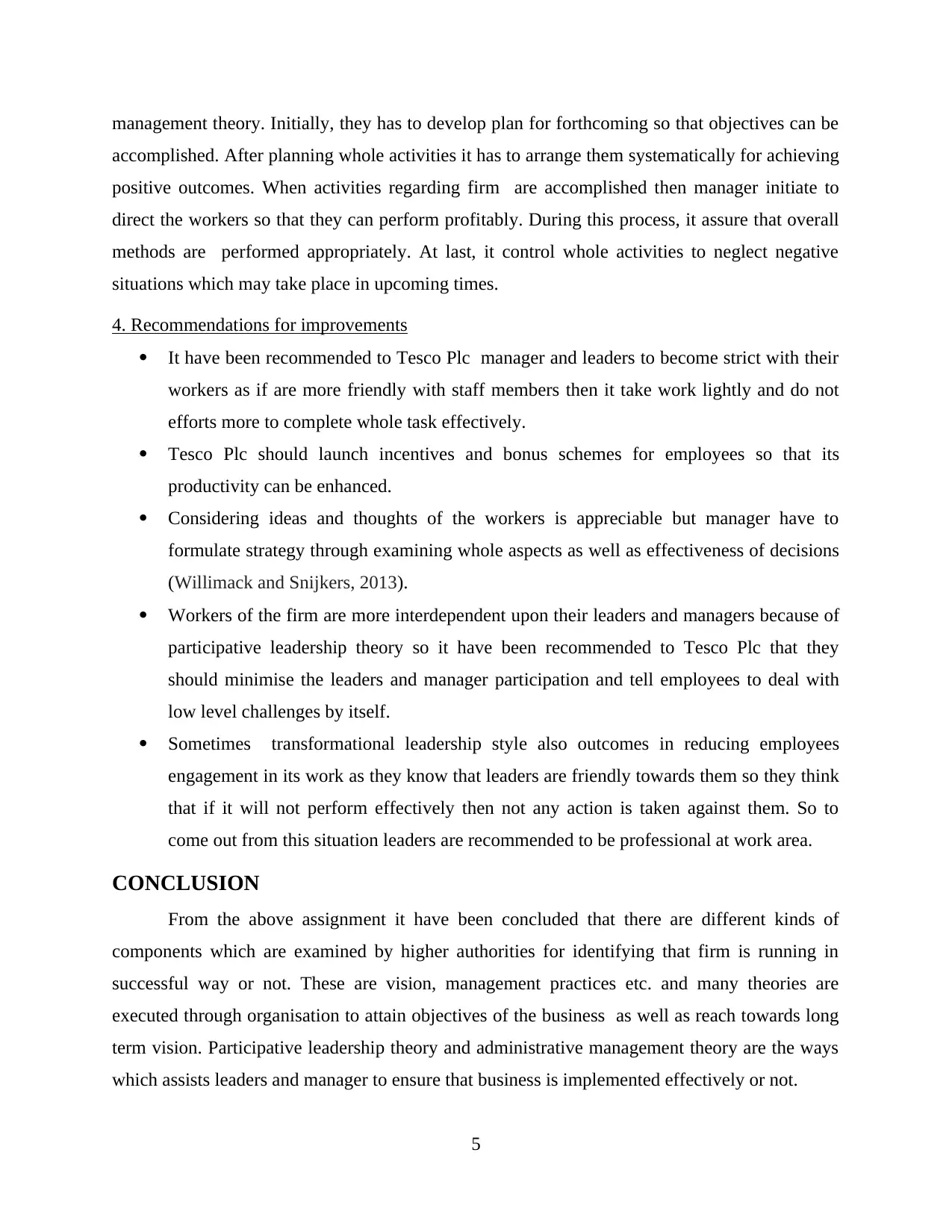
management theory. Initially, they has to develop plan for forthcoming so that objectives can be
accomplished. After planning whole activities it has to arrange them systematically for achieving
positive outcomes. When activities regarding firm are accomplished then manager initiate to
direct the workers so that they can perform profitably. During this process, it assure that overall
methods are performed appropriately. At last, it control whole activities to neglect negative
situations which may take place in upcoming times.
4. Recommendations for improvements
It have been recommended to Tesco Plc manager and leaders to become strict with their
workers as if are more friendly with staff members then it take work lightly and do not
efforts more to complete whole task effectively.
Tesco Plc should launch incentives and bonus schemes for employees so that its
productivity can be enhanced.
Considering ideas and thoughts of the workers is appreciable but manager have to
formulate strategy through examining whole aspects as well as effectiveness of decisions
(Willimack and Snijkers, 2013).
Workers of the firm are more interdependent upon their leaders and managers because of
participative leadership theory so it have been recommended to Tesco Plc that they
should minimise the leaders and manager participation and tell employees to deal with
low level challenges by itself.
Sometimes transformational leadership style also outcomes in reducing employees
engagement in its work as they know that leaders are friendly towards them so they think
that if it will not perform effectively then not any action is taken against them. So to
come out from this situation leaders are recommended to be professional at work area.
CONCLUSION
From the above assignment it have been concluded that there are different kinds of
components which are examined by higher authorities for identifying that firm is running in
successful way or not. These are vision, management practices etc. and many theories are
executed through organisation to attain objectives of the business as well as reach towards long
term vision. Participative leadership theory and administrative management theory are the ways
which assists leaders and manager to ensure that business is implemented effectively or not.
5
accomplished. After planning whole activities it has to arrange them systematically for achieving
positive outcomes. When activities regarding firm are accomplished then manager initiate to
direct the workers so that they can perform profitably. During this process, it assure that overall
methods are performed appropriately. At last, it control whole activities to neglect negative
situations which may take place in upcoming times.
4. Recommendations for improvements
It have been recommended to Tesco Plc manager and leaders to become strict with their
workers as if are more friendly with staff members then it take work lightly and do not
efforts more to complete whole task effectively.
Tesco Plc should launch incentives and bonus schemes for employees so that its
productivity can be enhanced.
Considering ideas and thoughts of the workers is appreciable but manager have to
formulate strategy through examining whole aspects as well as effectiveness of decisions
(Willimack and Snijkers, 2013).
Workers of the firm are more interdependent upon their leaders and managers because of
participative leadership theory so it have been recommended to Tesco Plc that they
should minimise the leaders and manager participation and tell employees to deal with
low level challenges by itself.
Sometimes transformational leadership style also outcomes in reducing employees
engagement in its work as they know that leaders are friendly towards them so they think
that if it will not perform effectively then not any action is taken against them. So to
come out from this situation leaders are recommended to be professional at work area.
CONCLUSION
From the above assignment it have been concluded that there are different kinds of
components which are examined by higher authorities for identifying that firm is running in
successful way or not. These are vision, management practices etc. and many theories are
executed through organisation to attain objectives of the business as well as reach towards long
term vision. Participative leadership theory and administrative management theory are the ways
which assists leaders and manager to ensure that business is implemented effectively or not.
5
Paraphrase This Document
Need a fresh take? Get an instant paraphrase of this document with our AI Paraphraser
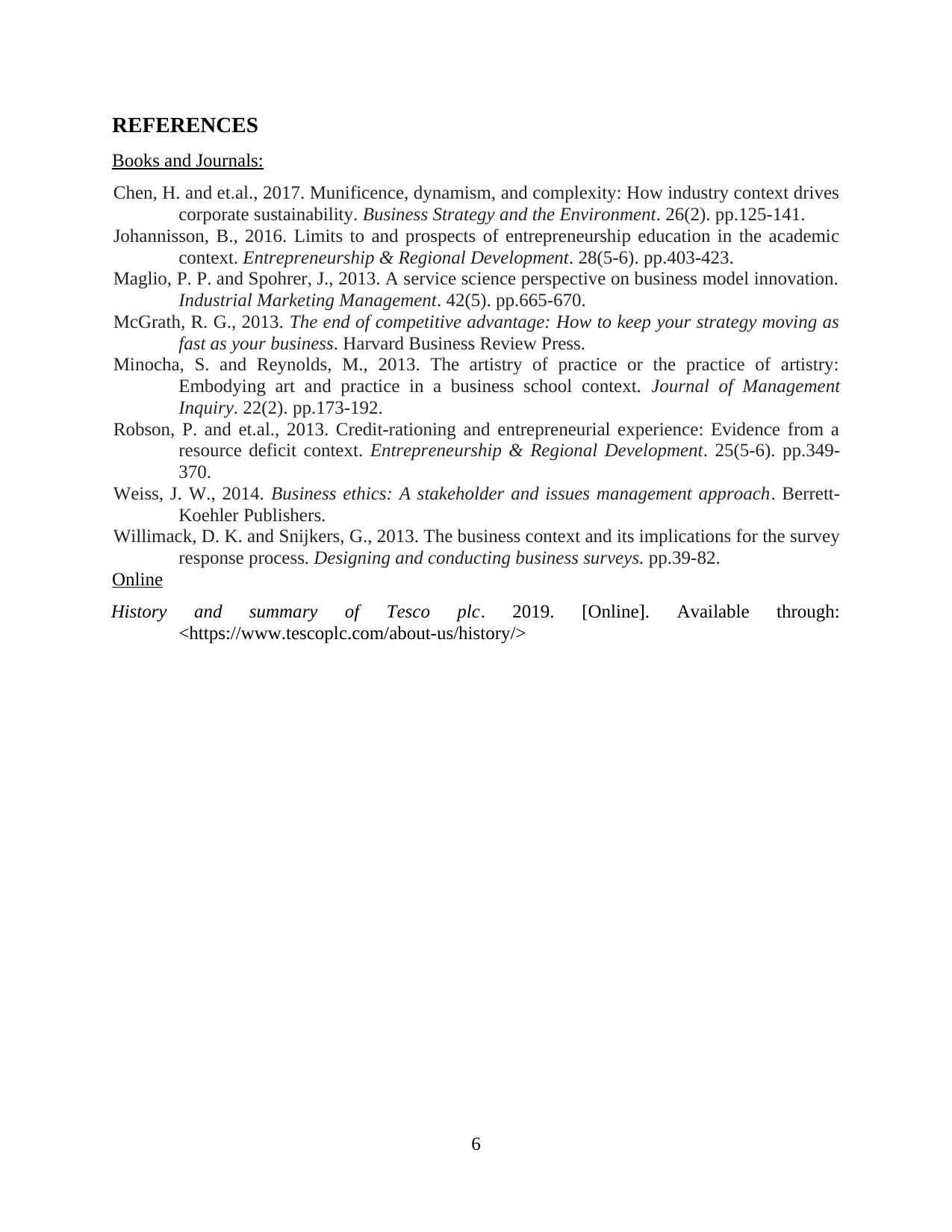
REFERENCES
Books and Journals:
Chen, H. and et.al., 2017. Munificence, dynamism, and complexity: How industry context drives
corporate sustainability. Business Strategy and the Environment. 26(2). pp.125-141.
Johannisson, B., 2016. Limits to and prospects of entrepreneurship education in the academic
context. Entrepreneurship & Regional Development. 28(5-6). pp.403-423.
Maglio, P. P. and Spohrer, J., 2013. A service science perspective on business model innovation.
Industrial Marketing Management. 42(5). pp.665-670.
McGrath, R. G., 2013. The end of competitive advantage: How to keep your strategy moving as
fast as your business. Harvard Business Review Press.
Minocha, S. and Reynolds, M., 2013. The artistry of practice or the practice of artistry:
Embodying art and practice in a business school context. Journal of Management
Inquiry. 22(2). pp.173-192.
Robson, P. and et.al., 2013. Credit-rationing and entrepreneurial experience: Evidence from a
resource deficit context. Entrepreneurship & Regional Development. 25(5-6). pp.349-
370.
Weiss, J. W., 2014. Business ethics: A stakeholder and issues management approach. Berrett-
Koehler Publishers.
Willimack, D. K. and Snijkers, G., 2013. The business context and its implications for the survey
response process. Designing and conducting business surveys. pp.39-82.
Online
History and summary of Tesco plc. 2019. [Online]. Available through:
<https://www.tescoplc.com/about-us/history/>
6
Books and Journals:
Chen, H. and et.al., 2017. Munificence, dynamism, and complexity: How industry context drives
corporate sustainability. Business Strategy and the Environment. 26(2). pp.125-141.
Johannisson, B., 2016. Limits to and prospects of entrepreneurship education in the academic
context. Entrepreneurship & Regional Development. 28(5-6). pp.403-423.
Maglio, P. P. and Spohrer, J., 2013. A service science perspective on business model innovation.
Industrial Marketing Management. 42(5). pp.665-670.
McGrath, R. G., 2013. The end of competitive advantage: How to keep your strategy moving as
fast as your business. Harvard Business Review Press.
Minocha, S. and Reynolds, M., 2013. The artistry of practice or the practice of artistry:
Embodying art and practice in a business school context. Journal of Management
Inquiry. 22(2). pp.173-192.
Robson, P. and et.al., 2013. Credit-rationing and entrepreneurial experience: Evidence from a
resource deficit context. Entrepreneurship & Regional Development. 25(5-6). pp.349-
370.
Weiss, J. W., 2014. Business ethics: A stakeholder and issues management approach. Berrett-
Koehler Publishers.
Willimack, D. K. and Snijkers, G., 2013. The business context and its implications for the survey
response process. Designing and conducting business surveys. pp.39-82.
Online
History and summary of Tesco plc. 2019. [Online]. Available through:
<https://www.tescoplc.com/about-us/history/>
6
1 out of 8
Related Documents
Your All-in-One AI-Powered Toolkit for Academic Success.
+13062052269
info@desklib.com
Available 24*7 on WhatsApp / Email
![[object Object]](/_next/static/media/star-bottom.7253800d.svg)
Unlock your academic potential
© 2024 | Zucol Services PVT LTD | All rights reserved.





